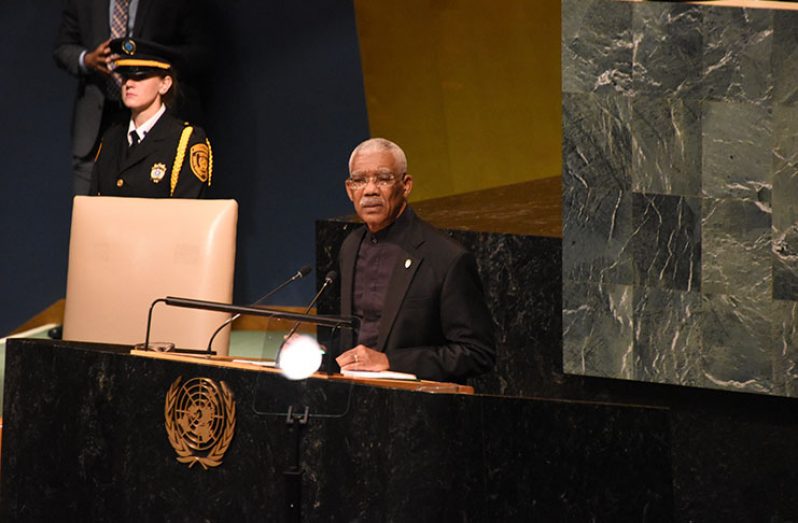–President Granger reiterates call for peaceful settlement of border controversy
By Svetlana Marshall in New York
PRESIDENT David Granger on Wednesday warned world leaders that there will be no peace this side of the Atlantic if justice does not prevail in the age-old Guyana-Venezuela border controversy.
“Guyana looks to the international community to ensure that Venezuela is not allowed to thwart the processes of judicial settlement, which is the clear and agreed path to peace and justice,” President Granger told world leaders assembled at the UN Headquarters in New York for the 72nd Regular Session of the UN General Assembly (UNGA 72).
Last September, the Guyanese President detailed the danger faced by his country in the wake of territorial claims made by its western neighbour, the Bolivarian Republic of Venezuela.
Today, one year later, he said, those claims have neither diminished nor have been diverted, but have rather intensified, with Venezuela increasingly becoming “more militaristic.”
Known for his equanimity in the face of adversity, the former army commander and retired brigadier told his colleague heads of state and other world leaders: “Four UN Secretaries-General have been seized of the Venezuelan claims. The choice has become one between just and peaceful settlement, in accordance with international law, and a Venezuelan posture of attrition that is increasingly more blustering and militaristic.
“In this matter, protraction is the enemy of resolution, and the ally of sustained conflict.” He reminded his audience that former Secretary-General Ban Ki-moon and his successor, Mr António Guterres, in keeping with the tenets of the 1966 Geneva Agreement, had agreed that if by the end of December 2017 significant progress has not been made towards arriving at a full agreement for the settlement of the controversy, the International Court of Justice (ICJ) will be the next means of peaceful settlement, unless Guyana and Venezuela jointly request otherwise.
Norwegian diplomat, Mr Dag Halvor Nylander, who was appointed the Personal Representative of the current UN Secretary-General on the matter, has been visiting both countries as he compiles his report.
President Granger told the assembly that Guyana has been working assiduously with Mr Nylander, and that when he meets later with Secretary-General Guterres, the work his personal representative has done will come up for discussion. He is also hoping to get a clear understanding of the progress that has been made thus far, he said.
NOTICEABLY ABSENT
Venezuela’s President, Nicolás Maduro (whose absence was noticeable during the General Debate and more so throughout the 72nd Regular Session of the UN General Assembly last week), through a statement issued by his government, agreed that the border controversy would be referred to the ICJ, if significant progress is not made at the end of 2017 at the level of the Good Offices Process.
However, the Venezuelan Government subsequently altered its statement, saying that mediation will be supported by the UN in order to find a practical and satisfactory solution to the controversy.
It’s perhaps the cue President Granger was waiting for, as he told world leaders in no uncertain terms that they should not allow the process set out by the former U.N. Secretary-General to be frustrated by Venezuela.
Prolonging of the controversy, he warned, will only serve to disrupt the peace in the Caribbean Region.
“The Caribbean people wish for the Caribbean to be a Zone of Peace. The Venezuelan claim to Guyana’s territorial integrity, however, would be a threat to that zone. “Venezuela is more than four times the size of Guyana. Venezuela, however, claims two-thirds of Guyana’s territory, including our maritime space,” President Granger said, adding that Guyana is heavily dependent on its territorial and maritime resources for the country’s development.
The international Arbitral Tribunal provided “a full, perfect and final settlement” 118 years ago in 1899. However, Venezuela denounced that Arbitral Award in 1962 at the Decolonisation Committee of this Assembly as British Guiana strove for its Independence.
Giving a global perspective on the matter, President Granger told world leaders that “striving for peace” must be humanity’s ceaseless quest, even as he pointed to the critical role being played by the UN in ensuring respect for international law through the International Court of Justice and the Security Council.
“Striving for peace,” he said, “must aim at resolving long-standing inter-state conflicts. Guyana, in this regard, supports the call for the reform of the Security Council to give even greater voice to developing countries. We iterate our support for a two-state solution to the Palestine-Israeli conflict. We affirm the right of the Palestinian people to a homeland and to a dignified existence.” The President also used the opportunity to demand the withdrawal of the injurious economic embargo imposed against the Caribbean island of Cuba by the U.S. government, since it is frustrating the State’s right to development.




.png)









